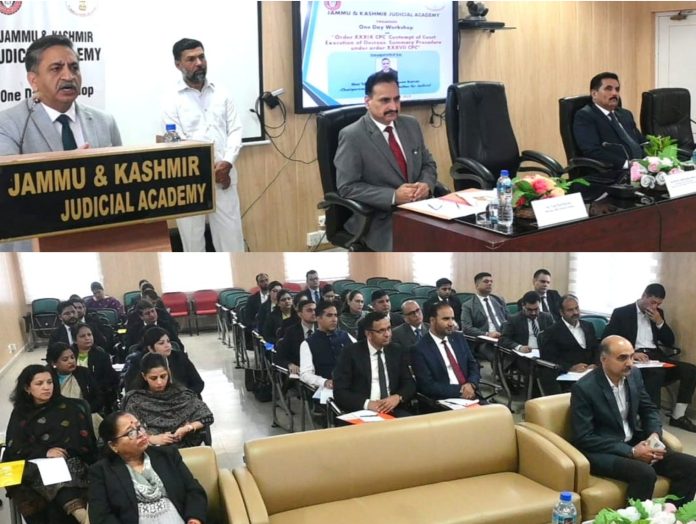JAMMU: J&K Judicial Academy under the patronage of Chief Justice, High Court of Jammu & Kashmir and Ladakh, (Patron-in-Chief, J&K Judicial Academy), N Kotiswar Singh and guidance of Chairperson, Governing Committee for J&K Judicial Academy, Justice Sanjeev Kumar besides Justice Javed Iqbal Wani, Justice Rahul Bharti and Justice Moksha Kazmi, members of Governing Committee for J&K Judicial Academy, organized one Day Workshop on “Order XXXIX CPC, Contempt of Court, Execution of Decrees, Summary Trial U/O XXXVII CPC” for Civil Judges (Senior/Junior Division) of Jammu Province at J&K Judicial Academy, Janipur.
The training programme was inaugurated by Justice Sanjeev Kumar, Judge, High Court of J&K and Ladakh and Chairperson, Governing Committee for Judicial Academy.
Justice Sanjeev Kumar, in his inaugural, address said that the behavior and conduct of members of the judiciary, inside as well as outside the court, must re-affirm the faith of public in impartiality and independence of the judiciary. He said that a constant effort should be put in to bridge the gap between what we say and what we do.
He described the origin of the power to grant injunction is from equity; hence the exercise of the discretion by the Courts is to be governed mainly by equitable considerations. He gave illustrations from his lordship’s real-life experiences and underlined the purpose of holding such training programmes to enhance the awareness level of judicial officers relating to laws and remove inhibitions as well as share best practices while applying the provisions thereof in the day-to-day work.
Director, J&K Judicial Academy, Y P Bourney, presented the welcome address and gave an overview of the programme. He said that a judicial officer has to be possessed of excellence not only from within but he should also visibly display the functional excellence which is necessary to fulfil the constitutional promise of justice by the judiciary as a whole. He emphasized that when a judge sits on trial, he himself is on trial and any action which may shake that foundation is not permitted.
In the first technical session, M.S. Parihar, Former District & Sessions Judge, High Court of J&K, deliberated upon the types and principles of injunction with reference to rules under Order XXXIX CPC. He added that there can be permanent injunction which is granted as a final relief in the suit and there can be temporary injunction which may be passed at any situation of the suit or proceedings for preservation of the property. Also, the execution proceedings have become a long-due process by which the parties did not get justice in time and this delay in completion of execution proceedings are against the principles of fair trial. The learned resource person also gave an in-depth detail of legal provisions relating to the Contempt of Court.
In the second technical session, Kikar Singh Parihar, Former District and Sessions Judge, High Court of J&K identified the core issues relating to execution of decrees and its types and procedure. He also discussed the constituents of Order XXXVII CPC and the procedures adopted therein. The learned Resource Person said that Order XXXVII CPC guarantees that the defendant does not drag out the proceedings and can seek permission to defend if he possesses the necessary defense to demonstrate that his position is substantive in character; otherwise, the plaintiff has a stronger hand in the case. He added that it also creates a suitable mechanism to guarantee that the defendant does not extend the lawsuit, especially as time is of the essence in business situations, and furthers the goal of justice.
All the sessions were interactive during which all the participants actively participated sharing their experiences and discussing various aspects of the subject topics. The participants raised several queries which were answered satisfactorily by the resource persons.


